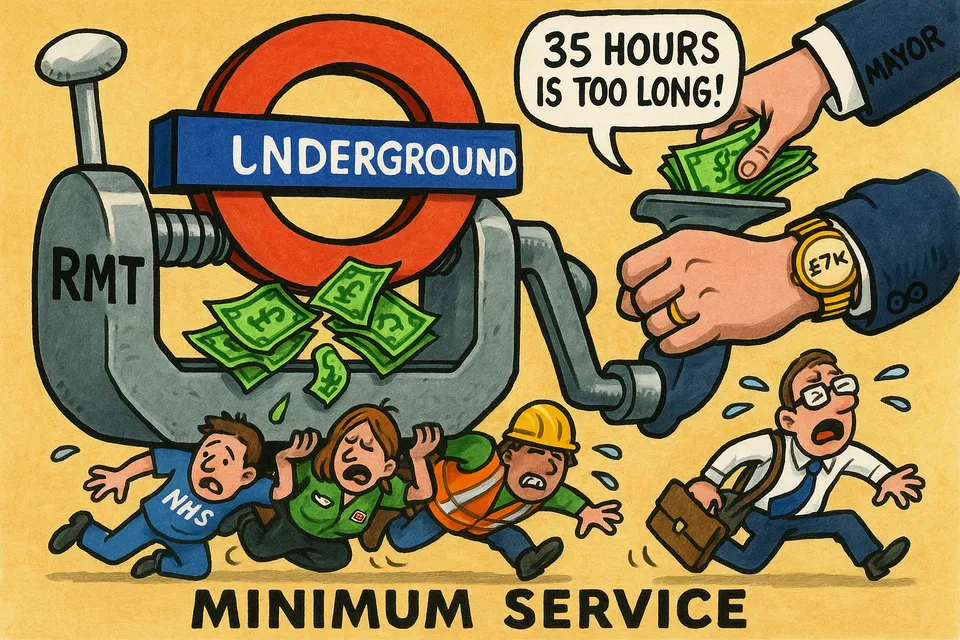Labour's Welfare Betrayal: A Masterclass in Political Cowardice

London Transport's Paralysis Exposes Britain's Institutional Decay and Governance Failure
While millions of Londoners face another week of transport chaos, tube drivers earning £71,000 are demanding shorter working weeks. The capital's entire underground network will grind to a halt for four days because 57% of RMT members voted to strike over their 35-hour week being too long.
Starting Sunday evening, London Underground will effectively cease to exist until Friday morning. The RMT has mobilized 10,000 of the tube’s 15,000 staff in a dispute that reveals the true power dynamics of modern Britain’s public services.
Transport for London offered a 3.4% pay rise, matching inflation. The union’s central demand: reduce the working week from 35 to 32 hours while maintaining full pay. For context, the average UK worker puts in 36.6 hours weekly. Train drivers already average £71,000 annually. Station staff earn £44,000. Some service controllers pull in over £100,000.
The strike ballot achieved just 57% turnout. This means roughly 5,700 workers voting yes can shut down transport for 9 million daily journeys.
Institutional Capture in Action
This isn’t about worker welfare. It’s about power. The RMT knows London cannot function without the tube. They know politicians will capitulate rather than face public anger. They know the system is designed to reward disruption over service.
Last year’s playbook proves the point. When strikes loomed in early 2024, Mayor Sadiq Khan materialized £30 million to buy peace, blindsiding his own negotiators. The message was clear: threaten chaos, get paid. The RMT learned their lesson well.
Now they’re back for more. Not just the 3.4% on offer, but reduced hours, extended travel perks, and “fatigue management” for workers already working fewer hours than most Britons. Eddie Dempsey, the new RMT boss replacing Mick Lynch, clearly understands the game.
The Real Cost of Dysfunction
Consider who pays for this institutional failure. Not the tube drivers on £71,000. Not the politicians who will eventually cave. Not the union leaders who’ve mastered the art of extraction.
The bill lands on minimum-wage workers who can’t get to their jobs. On NHS staff trying to reach hospitals. On small business owners watching another week of revenue evaporate. On parents juggling childcare because they can’t commute.
Transport for London claims they can’t afford to reduce working hours. Yet they found £30 million when politically expedient. They pay drivers more than teachers, nurses, or police officers. They maintain a system where service controllers earn six figures while the infrastructure they control crumbles.
The Pattern of Decline
This strike exemplifies Britain’s broader institutional decay. Public services become weapons against the public. Political leaders choose short-term bribes over long-term solutions. Well-compensated public sector workers demand ever more while service quality deteriorates.
The cycle is predictable: unions threaten strikes, politicians panic, taxpayers fund the settlement, nothing improves, repeat. Each iteration weakens the institution further. Each capitulation emboldens the next demand.
Meanwhile, the Elizabeth Line and Overground will run normally. Private operators somehow manage to provide service while TfL surrenders to union demands. The contrast is instructive.
What Competent Governance Would Look Like
A functioning system would establish minimum service requirements during strikes, as exists in other European countries. It would link pay to performance metrics that matter to passengers. It would prevent small minorities from paralyzing essential infrastructure.
Instead, London gets governance by ransom note. The RMT threatens. Politicians capitulate. Commuters suffer. The treasury bleeds. The city’s competitiveness erodes.
TfL management speaks of “fair and affordable” offers while demonstrating they’ll pay whatever it takes to avoid confrontation. The mayor who surprised his own team with £30 million will inevitably find more money when the pressure mounts.
The Bigger Picture
Four days of tube strikes isn’t just an inconvenience. It’s a symptom of systemic failure. When essential workers earning multiples of the median wage can shut down a global city to demand shorter hours, the social contract has collapsed.
When political leaders prefer paying ransoms to establishing sustainable frameworks, institutional integrity has evaporated. When public services serve their employees rather than the public, the purpose of governance has been inverted.
This is how decline manifests: not in dramatic collapse but in the steady erosion of basic functionality. In the normalization of dysfunction. In the acceptance that certain groups can hold society hostage without consequence.
London, once proud of its transport network, now watches it weaponized against its own citizens. The workers demanding reduced hours from their 35-hour weeks will get what they want. The politicians will declare victory in eventually ending the strikes. The unions will prepare their next set of demands.
And millions of Londoners will continue paying, through taxes and lost time and diminished opportunity, for a system that no longer pretends to serve them.
Commentary based on RMT strikes expected to bring London tube to a halt for four days by Gwyn Topham on The Guardian.